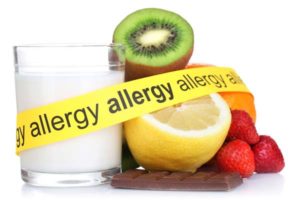
Common Type of Food Allergies
Many people around the world are allergic to certain foods. The most common food allergies include shellfish, peanuts, wheat, cow’s milk and food preservations. Food allergies cannot be cured, so avoiding the allergen that is responsible for the allergy is the only way to manage it.

What causes food allergies?
The body’s immune system produces antibodies to protect our body against harmful foreign particles. In case of a food allergy, an antibody known as immunoglobulin E (IgE) is produced. This IgE identifies certain proteins present in allergen food as harmful for the body. So, in response to it they release histamines, which in turn causes the symptoms of food allergy.
Certain genetic and environmental risk factors can also cause food allergy. Therefore, early identification is required to control the environmental risk factors which cause food allergy. As far as genetic factors are concerned, some people have more chances of developing food allergies than others.
Suppose if a person in your family has a food allergy, chances of you getting it are more. Also, a person’s diet during his/her infancy also has been linked to developing allergies in later life.
Common Food Allergies
The most common food allergies that Indians experience are of –
 Milk or lactose intolerance
Milk or lactose intolerance
Most children are allergic to cow’s milk since their childhood. Even if a small amount of milk enters their body, an allergy can be triggered. As they grow, some children grow out of cow’s milk allergy, but there are a few will continue to have this food allergy. This is also one of the common food allergies in adults.
 Eggs
Eggs
All foods made from eggs such as French toast, omelette, pancakes and cupcakes can trigger a reaction. But like milk allergy, this food allergy also fades with time.
 Nuts
Nuts
People who are usually have allergy to peanuts will remain allergic to it lifelong. Other nuts that can trigger allergic reactions include walnuts, almonds, hazelnuts and cashews. Very rarely do people have allergies to all these tree nuts, but those with an allergy to one type of nut can react to other nuts as well.
Shellfish
Shellfish is one of the most common food allergies. It includes shells, shrimps, crab, oyster, lobsters and squid. Allergy to shellfish tends to mostly occur in adulthood and in some cases, it can be serious.
 Soya bean
Soya bean
Soya bean allergy occurs in childhood and fades away with time. But some adults continue to be allergic to it. The allergic reactions to soya and other soy products such as soya sauce, soy milk, soya bean oil, start 1-2 weeks after the consumption of soy. People with soya bean allergy can also be allergic to milk.
 Wheat
Wheat
This is another most common allergy found in children. An allergen in wheat is a protein called gliadin, which is found in gluten. This is one of the main reasons why people having wheat allergy are often recommended a gluten-free diet. If you have wheat allergy avoid barley-based products, wheat bran, cereals, pasta, rotis and noodles.
Food additives & preservatives
Food additives are chemicals that keep foods fresh or enhance their flavour. One such example is monosodium glutamate (MSG), which can cause allergic reactions or sensitivities.
Tips to Manage Food Allergies
Eliminating allergens from the diet
This is very important in the management of food allergy. It involves eliminating the suspected food from the daily diet. But while doing so, one has to take advice from the experts to make sure that nutrients which are present in the excluded food are met by replacing it with a healthier option.
 Read food labels
Read food labels
Read the list of ingredients mentioned on the pack/ box of the food you want to eat. Don’t assume that you know the ingredients because sometimes the ingredients of a food item do change, so it is necessary to read the food label carefully. By law, it is compulsory to state the most common food allergens on the label. Avoid food products that do not mention the list of ingredients. For eg, when you are allergic to milk, look for names like whey and casein in the ingredient list on the pack.
Recognise early symptoms
Immediately take the medicine prescribed to you whenever you see the first sign of allergy.
Take care while cooking
Sometimes there might be cross-contamination while cooking, so one who makes food has to be cautious while preparing food.
Be careful when you eat out
Choose your dish wisely because while eating out it is difficult to find out what are the ingredients used in preparing a dish.
It doesn’t take long to trigger an allergic reaction in someone with a food allergy. Also, as the person grows older these allergies seem to increase and the persons get allergic to a lot more foods. Homeopathy combined with right nutrition and Ayurvedic herbs helps in reducing the frequency and the severity of the allergic reaction.
To get a FREE Consultation, call toll-free ![]() 1-800-843-0206 and book your appointment with Health Total experts.
1-800-843-0206 and book your appointment with Health Total experts.
 Milk or lactose intolerance
Milk or lactose intolerance Eggs
Eggs Nuts
Nuts Soya bean
Soya bean Wheat
Wheat Read food labels
Read food labels
